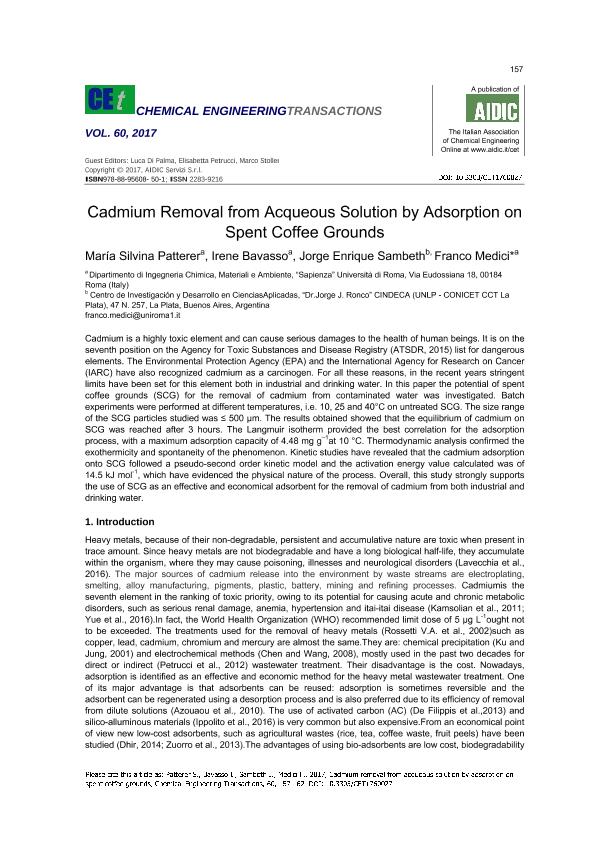Mostrar el registro sencillo del ítem
dc.contributor.author
Patterer, María Silvina
dc.contributor.author
Bavasso, Irene
dc.contributor.author
Sambeth, Jorge Enrique

dc.contributor.author
Medici, Franco
dc.date.available
2018-08-03T18:11:29Z
dc.date.issued
2017-12
dc.identifier.citation
Patterer, María Silvina; Bavasso, Irene; Sambeth, Jorge Enrique; Medici, Franco; Cadmium removal from acqueous solution by adsorption on spent coffee grounds; Italian Association of Chemical Engineering; Chemical Engineering Transactions; 60; 12-2017; 157-162
dc.identifier.issn
2283-9216
dc.identifier.uri
http://hdl.handle.net/11336/54099
dc.description.abstract
Cadmium is a highly toxic element and can cause serious damages to the health of human beings. It is on the seventh position on the Agency for Toxic Substances and Disease Registry (ATSDR, 2015) list for dangerous elements. The Environmental Protection Agency (EPA) and the International Agency for Research on Cancer (IARC) have also recognized cadmium as a carcinogen. For all these reasons, in the recent years stringent limits have been set for this element both in industrial and drinking water. In this paper the potential of spent coffee grounds (SCG) for the removal of cadmium from contaminated water was investigated. Batch experiments were performed at different temperatures, i.e. 10, 25 and 40°C on untreated SCG. The size range of the SCG particles studied was ≤ 500 μm. The results obtained showed that the equilibrium of cadmium on SCG was reached after 3 hours. The Langmuir isotherm provided the best correlation for the adsorption process, with a maximum adsorption capacity of 4.48 mg g-1at 10 °C. Thermodynamic analysis confirmed the exothermicity and spontaneity of the phenomenon. Kinetic studies have revealed that the cadmium adsorption onto SCG followed a pseudo-second order kinetic model and the activation energy value calculated was of 14.5 kJ mol-1, which have evidenced the physical nature of the process. Overall, this study strongly supports the use of SCG as an effective and economical adsorbent for the removal of cadmium from both industrial and drinking water.
dc.format
application/pdf
dc.language.iso
eng
dc.publisher
Italian Association of Chemical Engineering
dc.rights
info:eu-repo/semantics/openAccess
dc.rights.uri
https://creativecommons.org/licenses/by-nc-sa/2.5/ar/
dc.subject
Cd
dc.subject
Adsorption
dc.subject
Spend Coffee Ground
dc.subject
Isotherms
dc.subject.classification
Otras Ingeniería Química

dc.subject.classification
Ingeniería Química

dc.subject.classification
INGENIERÍAS Y TECNOLOGÍAS

dc.title
Cadmium removal from acqueous solution by adsorption on spent coffee grounds
dc.type
info:eu-repo/semantics/article
dc.type
info:ar-repo/semantics/artículo
dc.type
info:eu-repo/semantics/publishedVersion
dc.date.updated
2018-04-16T13:58:16Z
dc.journal.volume
60
dc.journal.pagination
157-162
dc.journal.pais
Italia

dc.journal.ciudad
Roma
dc.description.fil
Fil: Patterer, María Silvina. Università degli studi di Roma "La Sapienza"; Italia
dc.description.fil
Fil: Bavasso, Irene. Università degli studi di Roma "La Sapienza"; Italia
dc.description.fil
Fil: Sambeth, Jorge Enrique. Consejo Nacional de Investigaciones Científicas y Técnicas. Centro Científico Tecnológico Conicet - La Plata. Centro de Investigación y Desarrollo en Ciencias Aplicadas "Dr. Jorge J. Ronco". Universidad Nacional de la Plata. Facultad de Ciencias Exactas. Centro de Investigación y Desarrollo en Ciencias Aplicadas; Argentina
dc.description.fil
Fil: Medici, Franco. Università degli studi di Roma "La Sapienza"; Italia
dc.journal.title
Chemical Engineering Transactions
dc.relation.alternativeid
info:eu-repo/semantics/altIdentifier/doi/http://dx.doi.org/10.3303/CET1760027
dc.relation.alternativeid
info:eu-repo/semantics/altIdentifier/url/http://www.aidic.it/cet/17/60/027.pdf
Archivos asociados
